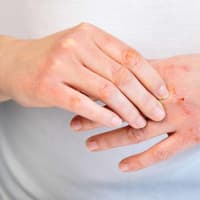
If our Stone Age ancestors wanted something to eat, they had to get out of the cave and hunt or collect fruit, mushrooms and roots. The prey was often small, the effort great. When people became permanently settled and started farming, there was also nothing for the stomach without a great deal of physical effort.
Increased risk of cancer due to plenty of food and too little exercise
Today, it is exactly the opposite: there is plenty of food and we hardly have to move at all. And what we eat is often industrially processed food with a high energy density. After all, potato chips, cola, muffins, chips and currywurst are cheaply available everywhere. At the same time, we are stuck in offices for hours on end, moving around in cars and buses, and in our free time we sit in front of the television or computer. But since our metabolism still works like it did 100,000 years ago, this has consequences: We are getting fatter and fatter. In Germany, 59 percent of men and 37 percent of women are now overweight. Almost one in four (24 percent) of both sexes is even obese.
You might think this is just a beauty problem. But it is not. Because if the body's fat content increases massively, this has consequences for health, especially if an excessive amount of fat accumulates inside the abdomen. Obesity increases the risk of a variety of diseases, including the risk of cancer. In fact, obesity affects far more types of tumors than previously thought. Scientists now assume that it promotes at least these 13 types of cancer: Colon cancer, esophageal cancer, renal cell cancer, liver cancer, pancreatic cancer, gallbladder cancer, ovarian cancer, cancer of the stomach, thyroid cancer, multiple myeloma and a certain type of brain tumor. Losing weight reduces the risk of cancer. That's why you should do everything you can to get rid of fat deposits on your stomach.
Preventing cancer: avoid energy-dense foods
To prevent cancer, you should therefore avoid foods with a high energy density (low weight, high calorie content), such as potato chips or pastries. Instead, eat low-calorie foods. Watch out for hidden calories in sugary and alcoholic drinks.
And make sure you get as much exercise as possible in your everyday life. Particularly recommended: endurance sports such as walking, swimming, cycling or dancing in combination with daily exercises that train the abdominal muscles.
Fat cells are chemical factories
The deep-seated fatty tissue in the abdominal smoke is particularly unhealthy. The spherical, reticularly connected fat cells here are a kind of highly efficient chemical factory that produces hormones, enzymes, messenger substances and anti-inflammatory and pro-inflammatory substances around the clock. The abdominal fat is therefore intensively involved in various metabolic activities.
metabolic activities. It helps regulate our feeling of satiety, as well as the insulin sensitivity of cells, blood sugar levels and the immune system. Excessive obesity throws these metabolic processes out of balance. Possible consequences: Diabetes, cardiovascular diseases, lipometabolic disorders.






